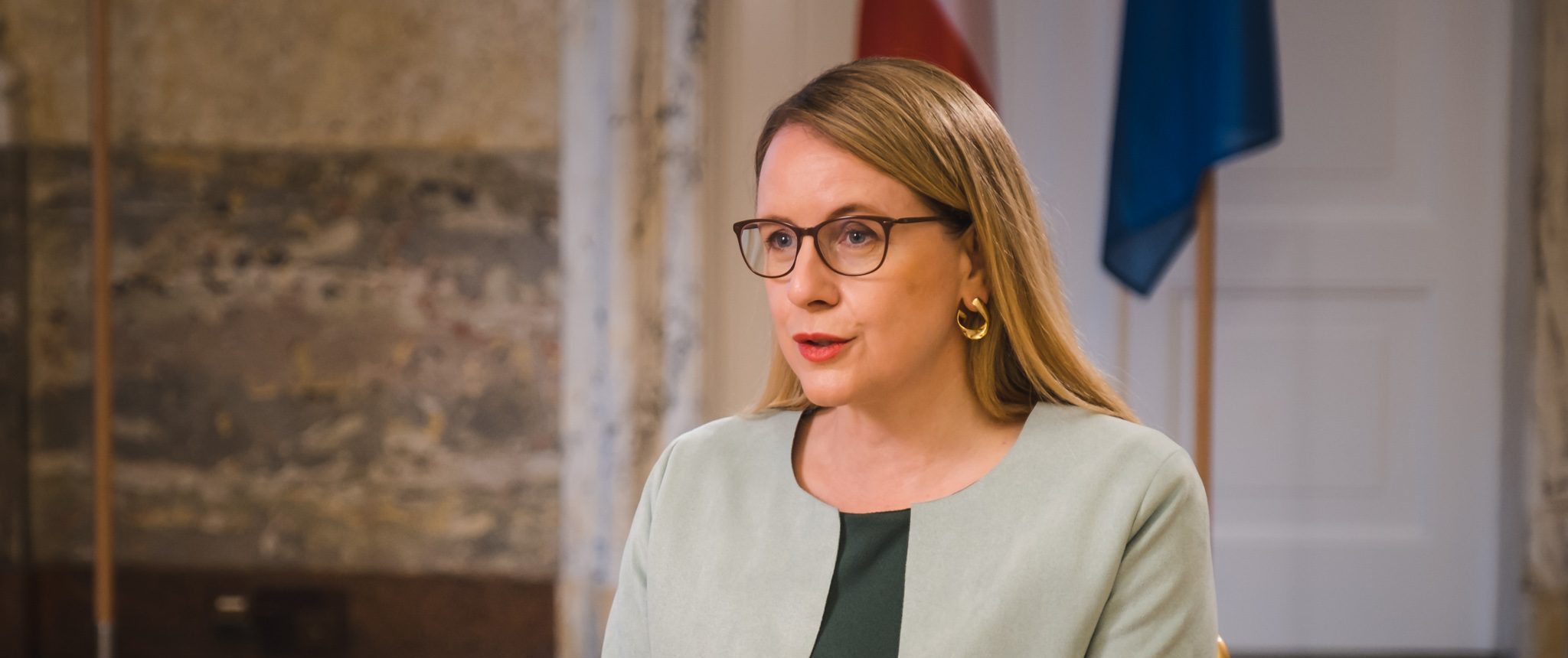Austrian Federal Minister for Digital and Economic Affairs, granted iGlobenews an exclusive interview. She shared her thoughts on many current topics including Austria’s Digital Tax Law, how best to support R & D in Austria and how to make Austria an even more attractive business location. She talked about how best support to women in technical professions.
Diana Mautner Markhof , 9 June 2021
Dr. Margarete Schramböck, Austrian Federal Minister for Digital and Economic Affairs, granted iGlobenews an exclusive interview. The topics covered ranged from Austria’s Digital Tax Law to her thoughts on how to support women in technical professions.
iGlobenews: Austria’s Digital Tax Law (Digitalsteuergesetz 2020) regulates the taxation of online ads and is aimed at multinational online advertising providers such as Facebook and Google. Many, including the opposition, have voiced concern that these companies have only passed these costs on to local businesses who use these platforms to place ads. Ultimately these costs reach the last link in the chain, the consumer.
Is the Digital Tax Law effective in achieving its goal? How do you respond to the critics, who do not oppose the tax but criticize Austria’s unilateral initiative, arguing for an EU-wide solution? In this connection, how will the recent proposal by the US for a minimum 15% global tax on multinational corporations and big tech companies affect Austria’s Digital Tax Law. 15% is lower than the Austrian corporate tax rate of 25% (which will be reduced to 21% by 2023)?
Minister Schramböck: Advertising in Austria has been taxed since June 2000 and that taxation should be extended to online advertising for reasons of fairness and equality of competition. Along the lines of the Austrian „Werbeabgabe” on classic advertising services, a digital tax of 5% was introduced for large digital corporations. Austria’s Digital Tax ensures equity in taxation. The character of the Austrian tax therefore differs fundamentally from the digital tax levied in France. The OECD and the EU are working hard on solutions, but none are available yet. Austria was and is committed to a solution on an international level. In the meantime, we launched a national solution. As soon as adequate solutions have been found on an EU or OECD level, the digital tax should be adjusted accordingly or transferred to this regulation.
iGlobenews: You had once said that COVID has beamed us into the digitalized future („wir wurden in die digitale Zukunft gebeamt“). Countries such as South Korea and Japan are much more digitalized than many European countries, including Austria. All major social media companies are non-European. The profits of companies, such as Amazon, have skyrocketed during COVID. Meanwhile, stores in our inner cities are dying and many local businesses will go bankrupt. In June 2020 you presented Kaufhaus Austria as part of Austria’s Digital Action Plan. While some have criticized the execution of the plan, the idea to push digitalization in Austria was correct.
Do you have further ideas on how to support the digitalization of Austrian businesses to increase their competitiveness against digital giants such as Amazon? What other measures should Austria take to keep up with advances in this digitalized world?
Minister Schramböck: In 2019, we resolved a “Digital Action Plan” as a general policy on digitalization covering the questions of how to create growth, jobs and prosperity through digitalization and how to provide secure, digital administrative services for businesses and citizens. In light of the ongoing corona crisis, we added a specific sub-chapter to the strategy that focuses on digital competences and combines immediate crisis management with restoring or ensuring the future competitiveness and innovative strength of the location [Austria]. Europe lost ground in the B2C area, as you mentioned, to the social media companies. Nevertheless, European companies have the lead in B2B. The race is not finished yet. My vision is to strengthen digital skills and create digital jobs. Boosting digital skills is the key to a successful digital society. That is why we have founded the so-called Alliance for Digital Skills and Professions that is intended to support know-how transfer among regional, national and EU-stakeholders. After all, 90 percent of all jobs require basic digital skills. We also implemented a program to enhance digital basic education with a main focus on the so-called MINT subjects: mathematics, informatics and computer science, natural sciences and technology. In addition to that, we established 13 new or modernized digital apprenticeship jobs such as an “e-commerce business person” or a “glass process technician”. Also, new apprenticeship job profiles in the field of artificial intelligence are planned.
iGlobenews: As the Federal Minister for Economic Affairs how do you propose to make Austria attractive for digital companies/startups? How can Austria support IT clusters and R&D in new technologies?
Minister Schramböck: The business location Austria offers a lot of advantages and is one of the most attractive business environments. Austria is the fourth richest country in the EU with above-average purchasing power of Austrian consumers. We offer excellent infrastructure, modern and efficient public administration and according to Mercer the highest quality of life. Businesses enjoy digital services considerably higher than the EU average in Austria. Austrians’ grasp of English as a second language ranks 8th, among the highest in the world. We are highly competitive when it comes to Research and Development (R&D) funding, with the second highest R&D/GDP ratio in Europe, surpassed only by Sweden.
iGlobenews: A topic which has been in the news of late is the MAN controversy. On 8 April, 64% of MAN workers rejected the proposal of Siegfried Wolf to take over the company. By 22 April Volkswagen, MAN’s parent company, reaffirmed its decision to move its production to Poland. If VW proceeds with this plan, up to 8400 jobs will be lost. A main reason for this move is the high ancillary costs (Lohnnebenkosten) associated with employment in Austria. These high ancillary costs are also the result of Austria’s unique, historical, and largely successful partnership between industry and labor (Sozialpartnerschaft). Going forward, the high costs of doing business in Austria will cost jobs and tax revenue.
As the Minister responsible for supporting Austria as a business location (Wirtschaftsstandort), how would you propose to make Austria more attractive to companies such as MAN, so that they choose Austria and remain there?
Minister Schramböck: As I said, Austria is one of the best business locations – basically for all sectors, even the automotive industry. Besides all things I have already said, we offer a wide range of business opportunities including funding and financial support measures for small and medium-sized enterprises, research and development, company start-ups, investments and new technologies. As you mentioned MAN, as soon as there is consent between the buyer and the vendor, we can have a look at possible support measures.
iGlobenews: Regarding Austrian Airlines: The airline industry is in a deep depression because of COVID. During the COVID pandemic and economic downturn, the Austrian taxpayer supported Lufthansa, the owner of AUA, with a total of EUR 600 million. Austrian Airlines is important for Austrian business and also for Austria’s attractiveness for tourism. Yet Lufthansa has now proposed to cut 1350 AUA jobs by 2023 and is in the process of reducing AUA’s management by 30% as well as the number of AUA flights.
What measures (legal and political) should the Austrian government take so that Lufthansa continues to support and not downgrade Austrian Airlines and the Vienna hub? In retrospect would it have been better for Austria to have maintained control over AUA?
Minister Schramböck: The rescue deal not only contains money. The Austrian Airlines also accepted a lot of liabilities, like the status of Vienna as the airline’s hub will be secured for at least ten years. Not only did we save jobs but also ensure targets for the airline to invest in more efficient technologies and thereby reduce its CO2 emissions and noise pollution.
iGlobenews: MAN and AUA have something in common. Both companies have received millions of Euros in support from the Austrian taxpayer. Both companies have vowed to maintain their businesses in Austria (and by implication not make large job reductions). Many are now of the opinion that these companies have not kept their end of the bargain.
The Austrian Social Democratic party (SPÖ) has called for Austria to invest in MAN to save jobs. Could you share your thoughts on this proposal? What is your position regarding the Austrian government’s investing in key Austrian-based companies?
Minister Schramböck: History showed that the state should not nationalize private companies. In some areas, like national security, there can be a national interest. In my opinion the best way to support our companies is with the best legal framework and business environment.
iGlobenews: Experts have estimated that each month of the COVID lockdown has cost Austria around 0,3% of its BNP. Austria is opening and it is estimated that up to 7000 skilled workers and professionals will be required to meet the needs of businesses and industry.
How can Austria attract and keep such skilled people? Will it be necessary to reform the immigration law so that Austria can attract people who will contribute to the continued economic growth and prosperity of Austria?
Minister Schramböck: In the last ten years Mercer has ranked Vienna with the highest quality of living worldwide. Austria offers a broad spectrum of cultural heritage, marvelous landscape and a dynamic and innovative economy. In the crisis we saw our very high standards in medical care and very good education. For third country nationals there is the possibility of the Red-White-Red Card. Therefore, I don’t think it is necessary to change the immigration law. In Austria there are about 400.000 people unemployed. We invest over 700 million in qualification programs.
iGlobenews: Before entering politics, you were a top manager at A1 Telecom and NextiraOne. In 2017 it was reported that your leaving the position as CEO of A1 was due to an internal power play by the Mexican majority shareholder, America Movil.
Do you think that your being a woman played a role in the A1 developments? How can women gain sufficient qualifications through education and job experience to meet the requirements for executive management positions? What more can be done on a political level to support women in top management positions? What personal experience can you share with women who are interested in a career in top management?
Minister Schramböck: I worked in the IT and telecommunications industry for 22 years. It wasn’t always easy having worked in a – back then – male-dominated information technology world. I had to deal with a lot of prejudices. I learned, in a male-dominated world it is even more important to stand up and show everyone that women can be as professional as men when it comes to technical jobs.
In general, the following applies: whether at work or in private life – women benefit when they team up. A strong network is essential in order to advance professionally. It is a question of business rather than a question of social responsibility that women are equally represented in a company at all levels and also in the top positions.
It is important that girls and women can use every initiative our government provides to develop themselves in technology or research and development. We must highlight the positive impacts on our society due to a higher participation of women in technical professions. I think it is important to increase awareness and get more girls interested in technical professions. Whether e-commerce, coding, digital entrepreneurs, scientists or engineers – I would like to encourage women and girls to choose technical and scientific training.





